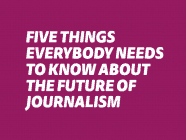Andrew Gowers was editor of the Financial Times from 2001 to 2005. He then moved into public relations, and was head of corporate communications at Lehman Brothers, and later head of group media at BP. He is currently global head of corporate affairs at Trafigura. He speaks to Stephan Russ-Mohl as part of our series to mark ten years of the EJO.
Looking back, did financial and business journalism fail in 2008?
Gowers: I don’t think so. Or rather, only in the sense that everyone failed in the run-up to the crisis: governments, regulators, bank executives and boards, borrowers, economists, and shareholders. In a sense financial journalists were also prone to the herd mentality that failed to see the crisis coming. But even before the bubble burst, there were honourable exceptions – journalists who chronicled and analysed the warning signs, and who can with hindsight legitimately claim to have been right. And once the crisis had arrived, I think financial journalists generally did a good job of explaining what was going on and spelling out the implications. It was a very rich period for business journalism and gave rise to a large number of excellent books, TV programmes and films as well as in depth newspaper and magazine articles.
Have there been significant changes since then? Is there a “learning curve”?
Gowers: Everybody has been on a significant learning curve, because journalists knew – just as regulators and politicians repeatedly said – that we were and to a large extent still are in uncharted territory. Nobody knows how the current monetary experiment will end. Equally nobody can be certain whether the new regulations adopted since the crisis will be adequate to prevent the next one. If there is one lesson that has been learnt above all from the events leading up to the crisis, it is that a degree of scepticism about the conventional economic wisdom at any given time is in order. I think journalists have taken that on board as much as anyone – perhaps more so.
You have experience on both sides – as a top editor who switched to corporate communication. Do journalists inevitably become victims of corporate communication management? How can financial and business journalism be improved?
Gowers: I have always taken a nuanced view of the supposed divide between journalism and corporate communications. In fact the relationship is far more symbiotic than is commonly supposed. Journalists need good relationships with corporate communicators to do their job, which is to report accurately and fairly on business (not always the same thing, by the way, as reporting what companies would like them to report). Without such communications, damaging errors can arise which in some cases can make journalists look foolish. Equally, communicators needs trusting relationships with journalists (some, not necessarily all) in order to do their job. I certainly don’t think it’s a question of one group becoming “victims” of the other – they need each other.
Will paywalls work for other media than the Wall Street Journal, the Financial Times, the Economist and the New York Times?
Gowers: The arrival of the universal mobile internet has posed an existential challenge for media of all kinds, and one that is still in relatively early stages so we can’t know definitively how it will turn out for any of them. But the story so far suggests three broad observations.
First, the internet is a massive accelerator and intensifier of media competition in a number of ways: it has eliminated the boundaries between different types of media, thus creating a brutal form of competition pitting all against all; and it has in effect abolished journalists’ previous monopoly on news communication in that anyone can report, comment and photograph and disseminate their work instantly for free.
Second, it has had a polarising influence – sharpening the contrast between mass-market media and more specialist “narrow-band” outlets. The former can survive and prosper by selling advertising to reach the mass of readers who visit their sites for free, so the logic is to build a product with unashamed mass appeal – as for example the UK’s Daily Mail has done in becoming, amazingly, the world’s most popular newspaper website. The latter have to focus on what they are really good at – in the case of the Financial Times, Bloomberg or the Wall Street. Journal, producing carefully researched and edited journalism that business readers are prepared to pay for because it is authoritative, accurate and well-judged. By definition, the number of outfits capable of producing this kind of material is not limitless – and nor is the universe of top-level readers available to fund it.
Which leads me to my third observation, that the toughest place to be in media right now is in what I would call the “muddled middle”, trying to cling to old models of being all things to all readers that no longer work, not having the popular appeal to match the mass vehicles and also lacking the unique insight that the specialists can offer. The attrition rate in this sector is high – just look at the number of regional and metropolitan newspapers that have disappeared in the US in the last five years.
Tags: Andrew, business, Business Journalism, Financial Journalism, Gowers, Journalism, media, News, paywall












































